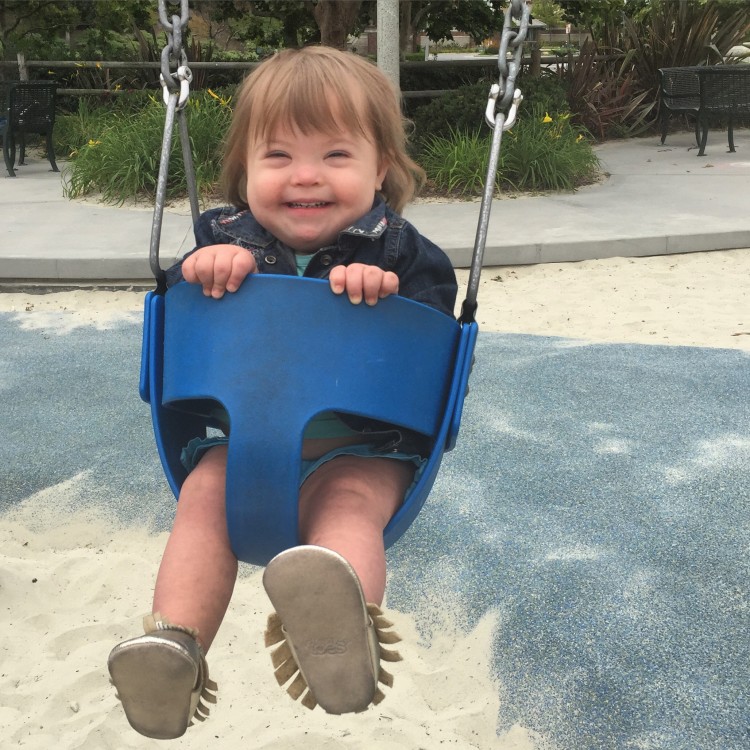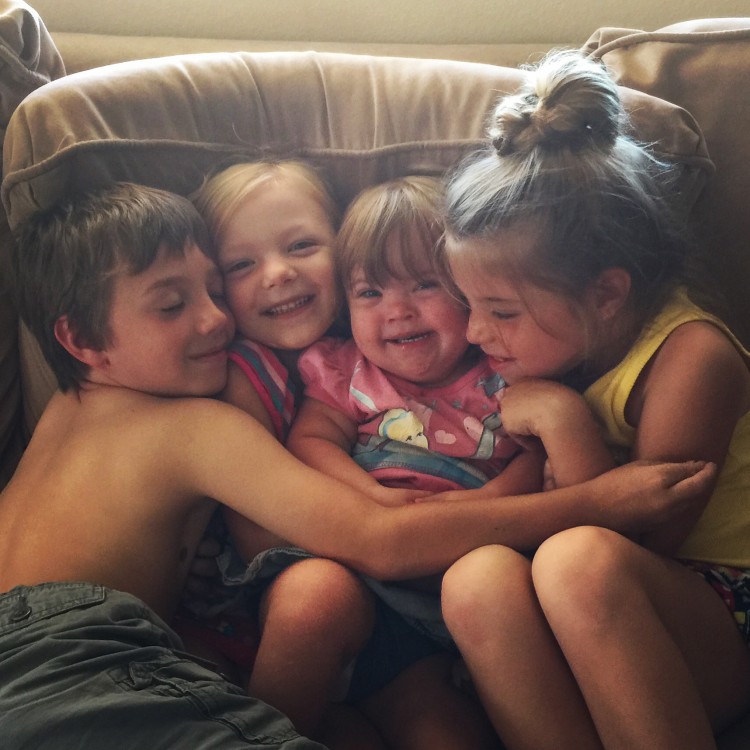My daughter was diagnosed prenatally with Down syndrome. When she was born, she was born in heart failure. During one of the frequent hospitalizations in the beginning of her life, I created a Facebook page, Team Carly Jean, for long-distance family to follow. After a few posts I made picked up attention and Carly’s health and development steadily improved, I began getting questions from parents all over the world asking for advice in coming to terms with their child’s diagnosis. In honor of Down Syndrome Awareness Month, I wanted to provide some reassurance.
“My daughter isn’t even trying to walk yet, she doesn’t even want to stand.”
“I can’t believe your daughter is talking so much. My son hasn’t said a word yet, and I’m getting worried.”
“My daughter is so far behind her ‘typical’ peers!”

“Surprise! I picked these flowers for you, Mom.” My 4-year-old leapt through the door. Her cheeks were dirty, but her smile gleamed, and in her hands she held a small bouquet of dandelions. “Aren’t they beautiful?!”
In our backyard, we have hollyhocks, daisies, forget-me-nots and roses. She presented me with a handful of two yellow dandelions and three empty stems.
“I made the wishes just for you! They are the most beautiful flowers I have ever seen!”
“Thank you. I think you are right. These might just be the prettiest flowers I’ve ever received.” We took the dandelions — and what was left of them — and put them in a Dixie cup of water and placed them on the kitchen counter.
That night after the kids went to bed, I went into the kitchen to get a snack, saw the dandelions and paused. She could have picked any of the flowers that were planted and growing in abundance, but she preferred the ones that were rare and spontaneous. The joy in her face, the way she felt so proud to have found the special flowers, and the fact that she wanted me to have them instead of keeping them for herself really did make the nearly bare stems seem like the most beautiful flowers in the whole world. They were perfect flowers. They grew from seeds, drew adequate sunlight and took enough nutrients from the soil to grow. Then their seeds spread when she blew the stalks. They brought my daughter a smile when she picked them, and they gave me happiness to receive them, maybe more than a store-bought bouquet could have.
My daughter taught me a valuable lesson. When we pause to appreciate something just as it is, it’s beautiful. It’s only when we compare it to others that we might find faults. Imagine if I had said to her, “Well, those aren’t beautiful. Those are just weeds. The daisies over there are much more beautiful.” When we begin to compare, we often lose the ability to appreciate what we already have.
It struck me, though, that when humans stand out as unique, we don’t necessarily appreciate their beauty. Sometimes people stare, and sometimes they avert their eyes.
Our children are perfect children. They began their journey in the womb, just like everyone else. They received nourishment from their mothers’ bodies and came out of them into the world, just like everyone else. They will experience life, with all of its twists and turns, just like everyone else. There is beauty in the fact that they are unique. They bring smiles and show love. They are perfectly themselves, just as they were made to be.
We’ve all done it at some point in our lives — compared ourselves to others to try to gauge where we are going based on what we observe. When we compare our kids to other kids, I believe we’re doing our children a huge disservice. Still, it seems natural to want to compare. Our minds like to file, rank, organize and sort information. We like to search for patterns and find a plan. Instead of comparing your child to anyone else, try exercising the ability to compare them solely to themselves. Next time you get the urge to compare, redirect the thought. What is your child doing today that they couldn’t have done a week ago, a month ago, a year ago? How have they shattered your expectations, no matter how little the action was? Maybe they successfully used a spoon and drank from a straw. Maybe they are two weeks out from a serious surgery and supporting their own head. That’s a lot of work!
Low muscle tone affects kids in different ways. When it comes to walking, they will get there in their own time, when they are ready. In the meantime, you have a little blessing in disguise, because you can use the time they are sitting to build on language and speech. If they take off walking early and speech is taking a while to come forward, that’s OK, too. Sometimes, oral tone is lower than the tone in their hamstrings. Eventually, with your guidance and love, the mouth can catch up to the legs. Even if the mouth never totally catches up and speech clarity is an issue, they can learn the building blocks of language and have the potential to sign (and I recommend signs anyway!) or use adaptive communication devices. We live in an amazing age for communication. Sometimes, they just have low tone everywhere. It’s not something you are doing wrong, it’s just the reality of their extraordinary little bodies. When we remove the comparison, all that is left is perfection. So as you watch all of your wishes for your little one come true, remember to thank the dandelions.

Suzie’s book, “Dear Team Carly Jean: Accepting Down Syndrome & Embracing Life,” is available on Amazon.
We want to hear your story. Become a Mighty contributor here.

